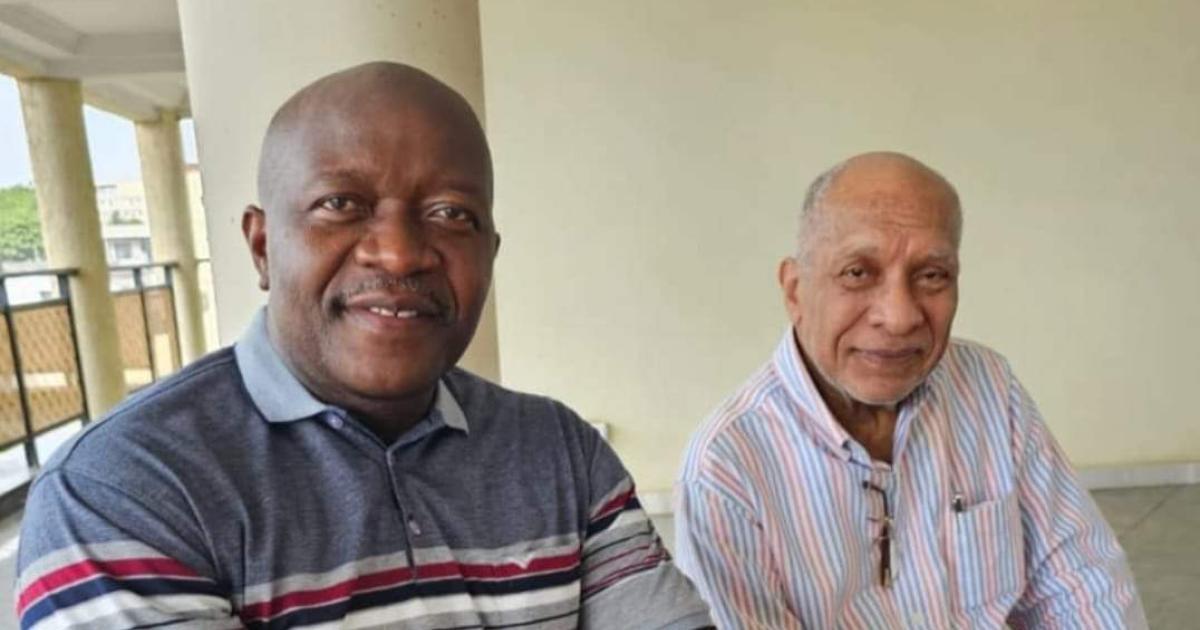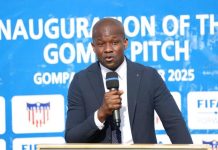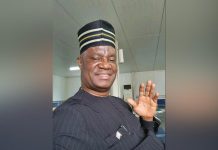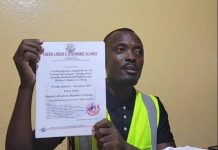
By Augustine Kpehe Ngafuan
Africa-Press – Liberia. In April 1998, I was elected Standard Bearer of the Vanguard Student Unification Party (SUP) of the University of Liberia and later President of the University of Liberia Student Union (ULSU), defeating a coalition of two student political parties. At the time, Charles Ghankay Taylor was President of Liberia and there was no love lost between President Taylor and the Vanguard Party. A year before his election as President of Liberia, cadres of SUP had prevented Taylor from attending a program on the main campus of the University of Liberia. The time and venue of the program conflicted with the timing and venue of a planned SUP rally.
The University of Liberia (UL) was and is still considered by many as the Liberian society in miniature. So, there was a huge expectation in the Liberian society that the ULSU president would be one of the champions of the interest of the downtrodden masses of the country. As the Standard Bearer of SUP and President of ULSU, I was not prepared to betray that trust. I was committed to upholding the core mantra of the Vanguard Party: “Even with guns to our breasts, we shall speak the truth.” And I was no stranger to the risk inherent in being a student leader under an intolerant national leader. As a student leader at the Booker Washington Institute (BWI), I narrowly escaped death in 1988 when nearly 60 soldiers of the Armed Forces of Liberia (AFL) from a nearby military base invaded the campus and began firing live bullets to “quell” a peaceful protest we had called in response to the deteriorating learning conditions at the institution and a slew of arbitrary actions taken by the school’s administration.
As a leader of over 10,000 students at the University of Liberia, I decided not to be a reckless rabble rouser. But I never flinched when it became necessary to speak truth to power in defence of the interest of students and the Liberian people. One of such occasions was when I spoke on behalf of the students of the University of Liberia at the Vision 2024 National Conference convened in August 1998 by President Taylor to “craft a long-term development vision” for the country. When I was called upon to speak by President Taylor, I spoke in unflattering terms about the state of affairs at the University and in the country and, as if I was looking into a crystal ball, advised President Taylor that if he did not change course, “all the visions we are busy piling up here would collapse like a pack of cards.” The Dah Kpana, as President Taylor loved to be called, was visibly peeved by my incisive comments, and I had to make myself scarce and changed my sleeping place every night for more than a week..
Considering the above, when I graduated from the UL at the top of the Blojay Class of 1999 with a BBA degree in Accounting & Economics (summa cum laude), I harbored no illusion that I could be hired by any government entity. My activism and my beliefs had effectively made me a pariah. My overarching goal, therefore, was to quickly find a scholarship to pursue graduate studies out of Liberia.
So, it was more than a pleasant surprise for me to have been included on the list of honored graduates of the UL that newly appointed Central Bank Governor Elie Saleeby wanted the CBL to interview for immediate employment at the CBL. Saleeby, a Liberian finance professional par excellence and a former World Bank expert, served as Taylor’s first Finance Minister before his appointment in 1999 to the position of Executive Governor of the newly established CBL The establishment of an autonomous, full-fledged Central Bank to replace the National Bank of Liberia (NBL) was one of the many financial sector reform measures recommended to President Taylor by Liberian financial experts who conducted a study of the Liberian financial sector.
I was employed along with eight other honored graduates of the University of Liberia on April 4, 2000. I was assigned as a Bank Examiner within the Supervision Department of the Central Bank headed by Mr. Kolli Tamba. My good friend, the late Mathew J. Innis, who occupied the adjoining desk, was one of the UL graduates assigned in the Supervision Department as a Bank Examiner. The CBL bank examination teams undertook regular and spot examinations of the four operating commercial banks in the country – LBDI, TRADEVCO Bank, Ecobank, and ITC, which later became IBLL.
A few weeks into our employment at the CBL, I got information from a credible source that some pro-Taylor zealots were incensed by my employment with the CBL and had even attempted to prevail on President Taylor to strong arm Governor Saleeby to dismiss me. Taylor did not do as they wished, ostensibly because he wanted to uphold the gentleman’s agreement between him and Saleeby. Such was the stature of Elie Saleeby that before he accepted President Taylor’s offer to serve as Governor of the CBL, he made the President to essentially commit to giving him (Saleeby) the free hand to operate a professional central bank and to take decisions in the best interest of the bank and the country.
After seven months with the CBL, ITC Bank, the commercial bank that had earlier hired my good friends and former schoolmates, Henry Saamoi and Edward Fayiah Davies, also wanted to hire me. ITC was offering me a tantalizing take-home pay of around US$600. The CBL was giving all the recently hired top graduates of the UL a take-home pay of US$248. My friends at ITC and a relative in the employ of the commercial bank really wanted me to join them. Also, the pay was very tempting. My paltry pay of US$248 could not adequately service the mounting demands from family members and friends, especially some of the comrades from the UL who harbored the notion that working at the biggest bank in the nation gave us access to big bucks.
But I really loved the CBL and the professional camaraderie and training it offered. Saleeby had brought in experts from the central banks of Nigeria, Ghana, India, and elsewhere to mentor the young professionals he had hired. These expats regularly facilitated training sessions on several banking and other topics of relevance, and we were also offered short-term training opportunities in the sub-region. It was indeed exciting to be a part of the CBL and to enjoy the badge of honor of being hired meritocratically by Elie E. Saleeby, the venerated veteran professional.
There is no gainsaying that I was unsettled in my mind on what to do. I planned to discuss the situation with my manager, Kolli Tamba, and then with Governor Saleeby. While trying to sort out my next move, a secretary in the office of Governor Saleeby gave me a call to inform me that the Governor wanted to see me urgently. This was around midday on a Monday, and I wondered what was so urgent to prompt my summoning to meet no less than the Governor himself. It was rare for a mere Bank Examiner to be cited to meet the Governor. My mind started playing games on me, as I began to worry about what I had done wrong.
When I entered the Governor’s suite, I was immediately ushered into the Governor’s office, which was a vast rectangular office that befitted the aura of the occupant. With palpable nervousness, I greeted the Governor with a slight bow and an unstable voice, “Hel- hel- hello Governor.”
Governor Saleeby immediately took me out of my misery. He smiled and greeted me back with a fatherly countenance that was so soothing. “Augustine, have your seat. Thanks for coming, and thanks for the good work. I am proud of you and all the other young people in the Bank. I am getting good reviews from your bosses.”
Then he went straight to the point, “The ITC folks gave me the courtesy of informing me that they want to hire you, but I told them while it was your decision to make, I wouod have to talk to you first.”
Then he said, “I know the offer that they made to you is very tempting, but I don’t want you to leave the CBL. I hired you and your colleagues to be the professional cornerstones of the new CBL, and my plan is to make you guys professional giants for the benefit of the CBL and the country.’’
He continued, “The CBL can’t compete with the pay ITC is offering you, but I want to inform you that I did not bring you guys here to be underlings. One thing I can assure is that being with the Central Bank will increase your growth options. In fact, we have been discussing with the Department of Administration to develop a concept note for the introduction of the CBL Graduate Scholarship Scheme to benefit people like you and other deserving bank staff.”
He then informed me that the CBL Management would be making a modest increase in our salaries beginning January 2001, which was just a month away. He told me to reflect on our discussion and return two days later to tell him my final decision.
Governor Saleeby’s words were so profoundly touching, and I felt that he was not just trying to cajole a gullible young professional. His words had credibility given his stellar capacity-building record when he served as the youngest president of LBDI from 1973 to 1980. With funding sourced from external partners and LBDI’s own resources, he introduced a graduate training program at LBDI that over the years benefitted former LBDI presidents James Cooper, David Vinton, and Francis Dennis, and other professionals like Elfrieda Tamba, Mildred Reeves, Alexander Benedict Cummings, and many others.
On the next day, the Human Resource Manager of the CBL informed me that our take-home pay would be adjusted from US$248 to US$328 effective January 2001. The US$80 pay increment was certainly far below what I would have made at ITC, but I was so happy to have been given the honor of a conversation with the Governor himself. I felt highly valued. Even without any promise of a pay increase, it would have been difficult for me to leave the CBL, especially given Governor Saleeby’s emphasis that remaining with the bank would increase my “growth options.” The phrase “growth options” had a positive, enticing effect on me. My immediate goal was to earn a master’s degree, and I was now convinced that remaining at the CBL with Governor Elie Saleeby at the helm, was my best shot at achieving my goal.
While I waited for the CBL to concretely roll out its Graduate Scholarship Program for Staff, I made personal efforts to secure scholarship opportunities to pursue graduate studies abroad. One person whom I communicated my desire with was former Liberian President Mrs. Ellen Johnson Sirleaf, who at the time was a prominent Liberian political figure and founder of Measuagoon, a local NGO that undertook community-based agriculture projects mainly in Cape Mount and Bomi counties. Mrs. Sirleaf had prevailed on me in 1999 to serve on the board of Measuagoon along with others including Cllr. Jamesetta Wolokollie, Mrs. Emma Shaw, and Dr. Edward McClain, Jr. I recall that the agriculture expertise of independent consultant Joseph Nyuma Boakai, now President of Liberia, was regularly sought by Measuagoon in the conceptualization and implementation of its community-based agricultural projects.
When I contacted her to help, Mrs. Sirleaf served on the board of a private university in the USA called Seton Hall University. Upon her encouragement, I sought and was granted admission into the University’s graduate program in Management. Mrs. Sirleaf then secured a 50% scholarship opportunity for me at Seton Hall and contacted Governor Elie Saleeby and other members of the CBL Board to put up the balance.
Once again, Governor Saleeby called me to his office. This time, I was not afraid, as I expected him to give me the good news that the CBL would provide the 50% balance funds to sponsor my education at Seton Hall. But again, Governor Saleeby was on a dissuasion mission.
“Augustine, Ellen contacted to request the CBL put up the balance of 50% for you to go to Seton Hall, and I know how passionately you want to go to school. But quite frankly, if you were someone else, I would have approved the amount immediately. But because it is you, someone who graduated summa cum laude from the UL and showing professional promise at the CBL, I want us to aim higher. Seton Hall is not a bad option, but I want you to earn your graduate degree from a better-ranked university, preferably one of the top-ranked institutions in the US. The cost should not be your worry. Just get the admission, and we will underwrite the cost. I am still committed to the promise I made to you last year. The CBL Board has approved the Management’s Graduate Scholarship Program and we will be rolling it out in 2002. I will talk to Ellen. Let’s allow this one to pass. Secure admission in a higher-ranked University and we will fully fund the cost. In the meantime, continue to do well on the job”
Again, I put my faith in Governor Saleeby and turned down another offer. It was akin to turning down a bird in hand for a bird in the bush. In early 2002, I was transferred from the Supervision Department to the Banking Operations Department and promoted to the position of Senior Banking Analyst. My take-home pay was increased to US$485 per month.
In 2002, the LURD rebellion against the government of President Charles Taylor intensified, reaching at one point as close as Clay in Bomi County, a few kilometers from Monrovia. The deteriorating security situation in the country obviously caused me to harbor some regrets. Why did I allow perfection to become the enemy of the good? Had the CBL provided the balance money required to attend Seton Hall University, I would have been in the US going to school and not constantly worrying that the deteriorating security situation in the country could completely torpedo Governor Saleeby’s plan to roll out the CBL Graduate Scholarship program, which I was desperately banking on. Whenever these thoughts of regrets crept in, I would just say a short silent prayer, asking the Almighty God to take control of everything and to let His perfect will for me come to pass.
The LURD rebel advance on Monrovia was temporarily halted and the rebels were pushed back to their bases in Lower Lofa County. In all of this, Governor Saleeby remained true to his words. The CBL underwrote the cost of my travel to Ghana to sit the Graduate Management Admission Test (GMAT) to qualify for admission into an MBA program in the USA. Having achieved well above their minimum GMAT scores for including a 6 over 6 score in the writing composition portion of the GMAT, several top-ranked US universities sent me admission offers in the latter part of 2002. I accepted admission into the prestigious MBA in Finance program of the Simon School of Business of the University of Rochester in New York State, USA. One other factor that informed my acceptance of the Simon School admission offer was that, unlike other top universities that were offering fall admission only which would have made me to wait for nearly a year before leaving Liberia for school, the Simon School also offered the option of a winter (January 2003) enrollment in their 18-month MBA program in Finance.
I left Liberia in late December 2002 and began graduate studies at Simon in Rochester, New York, USA in early January 2003. I graduated from Simon on schedule in June 2004 with an MBA in Finance and returned to the Central Bank of Liberia in July 2004.
During my absence from the country, the LURD rebellion engulfed the whole of Monrovia, and the operations of the CBL were temporarily affected. President Taylor was pressured into resigning in August 2003 and fled to Calabar, Nigeria, for refuge. Even during those dark days when it appeared like the sky was about to collapse on the country, Governor Saleeby remained true to his commitment. Not once did the CBL default on remitting my tuition and fees. In fact, the CBL offered graduate studies scholarships to seven of my workmates to pursue graduate studies in the US, beginning in fall 2003.
When I returned, Governor Saleeby was no longer with the Bank. He was succeeded by Governor Charles Greene in whose office I was assigned as a Professional Trainee. After three months of working directly with Governor Greene, I was made Head of International Banking of the CBL, a position I held until my appointment in January 2006 by newly elected President Ellen Johnson Sirleaf to the position of Director General of the Bureau of the Budget, a cabinet-level position.
On a recent visit to Liberia, I made it my duty to visit Governor Saleeby to drink from his fountain of wisdom. When I saw the veteran octogenarian, it became obvious that age had taken its toll on him. But what he lacked in physical robustness was more than made up for by his mental sharpness. We compared notes on a host of issues including the ensuing democratic transition in Liberia and the state of the Liberian economy. Each time he opened his lips, gems of wisdom excavated from his vast reservoir of knowledge and years of experience were released, and I felt intellectually recharged.
When I retrospect on how Elie Saleeby impacted my life – the opportunity of employment he offered me purely based on merit, his fatherly guidance to keep me on the right track, etc. –, I will remain eternally grateful to him and to the Almighty God for sending him as my destiny helper. At crucial junctures in my life, he led me on the right path. He did all this without having any prior personal connection with me or my family, and he cared less for my tribe, my county, my religion, my party, etc.
When I appeared in June 2010 in my capacity as Minister of Finance of Liberia to defend the draft 2010/2011 budget at a hearing of the Joint Ways, Means, and Budget Committee of the Legislature, a prominent senator asked me the question, “Mr. Minister, can you justify why there is an appropriation in the budget for graduate scholarships at this time of mounting domestic challenges affecting several sectors?
And I responded thus, “Honorable Senator, I am standing here today being grilled as the Minister of Finance of our country because years ago someone had the vision and good conscience to place an allocation in the CBL budget to enable me and other young professionals to acquire advanced education to serve the bank and our country more effectively. I, too, must have the good conscience and the vision to place funds in the budget to prepare the future leaders and professionals of the country. I have absolutely no regrets about allocating funds today so that the country can benefit tomorrow.”
For More News And Analysis About Liberia Follow Africa-Press





